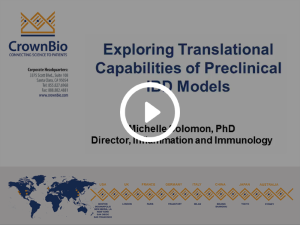On Demand Webinar
Exploring Translational Capabilities of Preclinical IBD Models
 Presenter: Dr Michelle Solomon, Director of Inflammation and Immunology, Crown Bioscience
Presenter: Dr Michelle Solomon, Director of Inflammation and Immunology, Crown Bioscience
The development of a variety of preclinical models has advanced our understanding of underlying inflammation and mechanisms of inflammatory bowel diseases (IBD). These models recapitulate various disease phenotypes, allowing researchers to improve their knowledge of mucosal immunity and to interpret complex responses of mice with different causes of colitis. More recently, the ability to define the intestinal microbiome under various conditions has enhanced our knowledge of how intestinal microorganisms impact inflammation.
Despite the development of these preclinical models, IBD remains a complex disease without a cure. Additional models with more diverse phenotypes and humanized backgrounds are needed to improve the assessment of the many novel therapeutics in preclinical and clinical development.
This webinar focuses on the translatable models that have yielded major insights into IBD pathogenesis. We will discuss effective strategies for incorporating translational IBD models into preclinical studies to progress IBD drug development programs.
Watch this webinar to learn:
- How IBD mouse models aid in understanding disease mechanisms and identifying therapeutic targets
- The new trends in IBD research and therapeutic development
- The pros and cons of current IBD models, and how this influences model selection
- How to advance your IBD drug development by using more translational preclinical models
- How to optimize preclinical IBD study design for efficacy
Watch Now!
About The Presenter:
 Michelle has over 10 years industry experience at Arena Pharmaceuticals, where as a Senior Scientist she was primarily responsible for pharmacology of two programs currently in clinical development; Etrasimod/APD334 (a small molecule, S1P1 functional antagonist; Phase 2) for Inflammatory Bowel Disease and Multiple Sclerosis and APD371 (CB2 agonist; phase 2) for visceral pain. She also contributed to Locaserin (Belviq: 5-HT2c receptor agonist) drug approval by the FDA’s advisory panel.
Michelle has over 10 years industry experience at Arena Pharmaceuticals, where as a Senior Scientist she was primarily responsible for pharmacology of two programs currently in clinical development; Etrasimod/APD334 (a small molecule, S1P1 functional antagonist; Phase 2) for Inflammatory Bowel Disease and Multiple Sclerosis and APD371 (CB2 agonist; phase 2) for visceral pain. She also contributed to Locaserin (Belviq: 5-HT2c receptor agonist) drug approval by the FDA’s advisory panel.
Michelle received her PhD in Transplantation Immunology at the Australian National University, and traveled to the US for her post-doc at The Scripps Research Institute. There she received grants from the Juvenile Diabetes Foundation and National Institutes of Health to investigate the role of chemokines in autoimmune diabetes. She currently leads the inflammation and immunology team at the Crown Bioscience site in San Diego.

 Presenter: Dr Michelle Solomon, Director of Inflammation and Immunology, Crown Bioscience
Presenter: Dr Michelle Solomon, Director of Inflammation and Immunology, Crown Bioscience Michelle has over 10 years industry experience at Arena Pharmaceuticals, where as a Senior Scientist she was primarily responsible for pharmacology of two programs currently in clinical development; Etrasimod/APD334 (a small molecule, S1P1 functional antagonist; Phase 2) for Inflammatory Bowel Disease and Multiple Sclerosis and APD371 (CB2 agonist; phase 2) for visceral pain. She also contributed to Locaserin (Belviq: 5-HT2c receptor agonist) drug approval by the FDA’s advisory panel.
Michelle has over 10 years industry experience at Arena Pharmaceuticals, where as a Senior Scientist she was primarily responsible for pharmacology of two programs currently in clinical development; Etrasimod/APD334 (a small molecule, S1P1 functional antagonist; Phase 2) for Inflammatory Bowel Disease and Multiple Sclerosis and APD371 (CB2 agonist; phase 2) for visceral pain. She also contributed to Locaserin (Belviq: 5-HT2c receptor agonist) drug approval by the FDA’s advisory panel.
